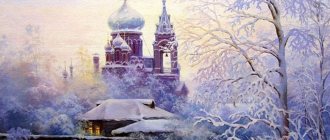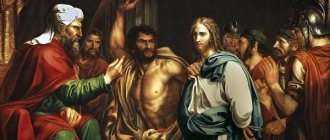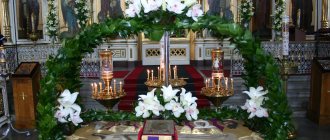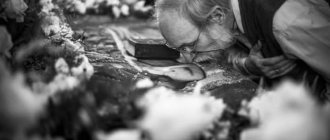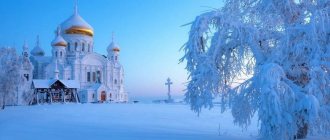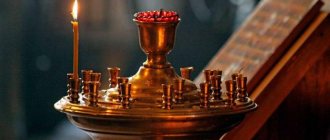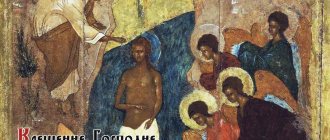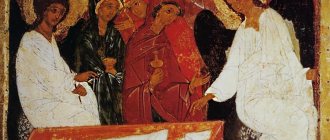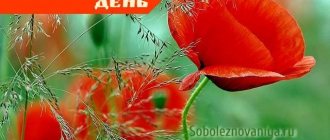Epiphany evening or Epiphany Eve is a day of the Slavic folk calendar, celebrated on January 18. Christmas time is coming to an end. The last day of caroling, the last Christmas fortune-telling. At Epiphany, snow is collected, which is believed to have special healing properties and keeps the water in the wells fresh throughout the year.
Epiphany Christmas Eve: what is it, the history of the holiday
In the Russian Orthodox Church this day is called the Eve of the Epiphany, or Epiphany Christmas Eve.
Until the 5th century, it was customary to remember the birth and baptism of the Son of God on one day - January 6, and this holiday was called Theophany - Epiphany, which spoke of the incarnation of Christ into the world and the appearance of the Trinity in the waters of the Jordan. The celebration of the Nativity of Christ was moved to December 25 (according to the Julian calendar, or old style) later, in the 5th century. This was the beginning of a new church phenomenon - Christmastide, ending with Vespers, or Christmas Eve, the feast of Epiphany.
Sacrament of Baptism
This phrase denotes the spiritual rebirth of a person, this is his birth for the Orthodox Church, where he gains access to Confession, where he unites with God. The peculiarity of the ritual consists in immersing a man, woman or child three times or pouring water over them while reading prayers. After this, a personal cross is put on the Christian, and then the person changes into white clothes. The meaning of this sacrament is that after it a man, woman or children can live according to Christian laws - commandments.
Epiphany Christmas Eve: Orthodox traditions and customs
On the eve of Epiphany, a strict fast was observed. Therefore, the festive dinner on Epiphany Eve was nicknamed “hungry kutya”. Kutya, oatmeal jelly and pancakes were always present on the festive table. At Epiphany, pancakes were carried to the barn for the brownie to ensure the well-being of the livestock. The peasants ate pancakes so that there would be a good grain harvest in the coming year.
There is no special riotous fun on Epiphany Eve. If a person has the opportunity to be in church at this time, then it would be good to be there. Moreover, all the services of this cycle - Christmas - Christmas Eve - Epiphany - are special and very beautiful. This, by the way, is recognized by people who go to church for the first time on Christmas Eve.
Epiphany Christmas Eve is a day of strict fasting and repentance. Fasting prepared believers for the feast of the Epiphany, which was always distinguished by pomp and solemnity. The blessing of water occupies a central place in it. Two rites of consecration of water are performed: one on the eve of the holiday - inside the temple, the other - on the day of Epiphany - at the nearest reservoir.
It is believed that Epiphany water gives health, sanctification, blessing and purification. On Epiphany at midnight we went to the river to fetch water. There is a belief that at this time the water in the rivers sways. Water was poured into the bowl in the evening, and at midnight it was supposed to sway on its own. If this happened, then this is a good sign - it means that the person saw the appearance of the Lord.
On Epiphany evening they collected snow. It is believed that it heals diseases. It was used for washing, so the water from it was stored for a long time. It was also believed that only with its help can the entire canvas be whitened as needed. Snow was also collected for a bathhouse: “A snow bathhouse will add beauty.” They believed that if the snow collected that evening was thrown into a well, the water in it would not deteriorate or dry out throughout the year.
Home ritual for happiness using holy water
Everyone brings home holy water, but not everyone performs the ritual for a happy family life. For this ritual you will need a small broom that can be made from sargo. You can buy a new broom and turn it into a broom. The effect of the ritual will be stronger if, instead of a store-bought broom, you use sargo grown with your own hands. True, this should have been done in the fall.
Next, you need to pour water into a saucer or deep cup. We will dip the whisk and then sprinkle it in the form of the sign of the cross. You need to do this in each room and in each room after splashing say the words:
“Holy water brought health, happiness, light to our home and will protect our hearth from the dashing and the evil. And it will be so Amen!”
It is advisable to use all the water poured into the saucer for ritual purposes. It will be wonderful if splashes of holy water fall on household members. There is no need to throw away the used broom. It is soaked in holy water and has powerful energy to protect against dark forces. Leave it next to the front door as a talisman.
This ritual allows you to gain respect and mutual understanding between family members, to improve relationships spoiled by conflicts and quarrels. In addition, the ritual will cleanse the room of dark and unclean energies that have accumulated over the whole year and possible curses of your ill-wishers.
What to serve on the table on Epiphany Christmas Eve
The festive dinner on Epiphany Christmas Eve was called “hungry kutya”. The obligatory dishes of this meal were kutia, pancakes, and oatmeal jelly. On Epiphany night, young people spent their last Christmas party with songs, fortune-telling and other entertainment.
In the evening it was customary to eat juice . Until the beginning of the 20th century in Rus', this dish (like kutya) was prepared mainly from rye grains, and later from rice and wheat grains. That is why many city residents are more familiar with kutya and sochivo, made from rice.
To make it juicy, there are several surefire ways. First, the wheat grains are soaked, and then they are placed in a cast iron pot and filled with a large amount of water. The cast iron is put into the oven for 2.5-3 hours of simmering. After which the grains turn out soft and tasty. It is also very important to quickly pour hot, well-fed (a solution of honey and water) over the grains. Then the juice turns out really juicy.
Guests are never invited to Sochivo. You can treat your family and friends with porridge by bringing it home to them. Each family member needs to eat at least a spoonful of this dish before the main meal.
Sochivo is prepared not only from rice, but also from rye and wheat grains. It is believed that each ingredient of the dish has its own sacred meaning. For example, wheat symbolizes fertility and new life. Honey represents the sweetness of life and various benefits. Nuts are a symbol of prosperity and abundance. And raisins are the unity of male and female energies. Poppy symbolizes wealth, and dried fruits symbolize beauty.
What not to do on Epiphany Eve January 18
The consumption of many foods before Epiphany is prohibited. The fast lasts from the evening of January 17th. In this regard, you should not eat meat and fish dishes. In addition, alcohol and dairy products should be excluded from the diet.
On Epiphany Christmas Eve you cannot overeat and have noisy parties. It is advisable to stop watching entertainment programs on TV.
Even on January 18, you can’t do laundry or sweep trash out of corners.
On this day you should not quarrel with family and friends, or use foul language.
Epiphany Christmas Eve - Slavic customs on Epiphany evening
For the last time, the mummers are walking around the village, carrying burning brands, and knocking on every window with a bear's paw. On this day, Kolyada “rides off on white horses.” In Polesie, trees, horses, people and carts are painted on window frames and doors. In some places they “write out Kolyada”: they draw three crosses with chalk on the windows and doors, crossing themselves, having with them a loaf of bread, a candle, a plate, a spoon of kutya, and holding a hat at hand. After this, they sit down to dinner (“vecherati”).
The ritual meal on Epiphany Eve took place according to the customs of “kolyadnye” (festive Christmas Eve) dinners. An odd number of Lenten dishes were prepared.
The Eastern Slavs necessarily cooked kutya, dishes made from peas or beans, uzvar from dried fruits, and baked pancakes and bread products. At dinner, some Christmas customs were repeated: they invited “frost” (“the wolf”, “birds”, “animals” and other characters) to dinner; they threw the first spoon of kutya to the ceiling; they lit a candle “for the dead”; They set aside a portion from each dish for the souls of their ancestors.
On Epiphany Christmas Eve, the Bulgarians had their last Christmas dinner (Bulgarian: kadena supper): walnuts and grain were added to the Lenten dishes; they lit a candle that had not burned out after the previous two Yuletide meals.
The Croats of Samobor only on the eve of Epiphany began to eat the ritual bread letnica (Croatian letnica), which was laid out on the festive table every time on the eve of Christmas, New Year, and Epiphany.
The Slovenes baked three loaves of bread at Christmas time, the largest of which (Slovenian: poprinjak, mocen kruh) was eaten on the Day of the Three Kings in order to be strong and healthy.
In the Rhodope Mountains they baked bread similar to Christmas bread with a baked coin used for fortune telling. After dinner, they fed poultry in a barrel hoop, told fortunes, tied straw around fruit trees, and performed other rituals similar to the magical practice of the Christmas-New Year cycle.
Epiphany Christmas Eve: signs and beliefs
“Epiphany Evening” was considered a time of rampant evil spirits. During this period, it is possible to communicate with another world and evil, which strives to enter the home as a werewolf in any guise: dogs, cats, snakes, pigs. But often werewolves enter a house in the guise of a baby, a wanderer, a miller, a blacksmith, or they can take the form of an acquaintance - a relative or neighbor.
Ideas about werewolves go back to ancient times. They are associated with the belief that shamans or sorcerers have the ability to take the form of an animal, a person, a plant, and even a stone. The belief in the existence of werewolves developed under the influence of the idea of the animation of all nature (animism), the origin of people from various animals (totemism), and the cult of fertility.
The Slavs divided the year into two halves - winter and summer. The off-season periods - autumn and spring - were considered “the times between times.” At this time, nature is on the verge of life and death. Our ancestors believed that during periods of “between times,” which also include midnight and noon, spirits and souls are especially active. According to the belief of the ancients, during these periods of time people, having changed their appearance, can visit another world and come into contact with evil spirits, to their detriment or benefit. A person only had to put on the skin of some animal or decorate himself with other attributes of nature, and he, while remaining human, at the same time turned into another creature or object, being at the same time “neither one nor the other.”
Over time, the idea developed in people's minds that some people are more capable of such transformations, while others are less capable. Those who are more capable are able to quickly and directly contact the forces of nature, either benefiting people or harming them. Based on these thoughts, the belief in werewolves arose.
Saving plot from damage
Our ancestors effectively fought against damage and the evil eye using Epiphany spells. Many ancient rituals were lost, but one still reached our generation. This spell can be used without swimming in an ice hole. First, you should go to the temple and consecrate a bottle of water. When you get home, get into the bath, tip the bottle over the top of your head and, pouring water over yourself, say:
“The Lord God was born on earth, and at Baptism he was baptized in the name of Jesus Christ. As this holy water flows from me (proper name), so along with it all the damage from the unkind gaze of my enemy goes away. From now on and forever. Amen".
Under no circumstances should you heat holy water before the ceremony. As a last resort, let it sit in a warm room.
How they told fortunes on Epiphany Eve
Epiphany is the last night of Christmas fortune-telling. The girls went out of the gate to cast a spell on the first person they met:
- meeting a young guy means getting married soon;
- meeting an old man is not good.
Dreams that occur on the night of Epiphany are considered prophetic. Therefore, when you wake up, be sure to remember what you dreamed.
They wondered about the harvest. According to legend, frost on Epiphany night falls on those grains that will be harvested next summer, and those whose harvest will be poor will remain dry. To do this, they put different grains in cups outside at night, and in the morning they examined them: whichever frost fell on, that one would be born.
Epiphany fortune telling for wish fulfillment
On Epiphany Christmas Eve you can tell fortunes for the fulfillment of a wish. To do this, in the evening, light a candle in front of the icons and pray, asking the higher powers for patronage and protection. Then, on a separate sheet of paper, write down one of your wishes. There should be no more than ten of them in total. Desires must be feasible and real. Before going to bed, place the leaves under your pillow.
In the morning, wash yourself three times with Epiphany water and say:
“Let your wish come true on a magical night, Let everything good you dream about never be forgotten. The evil eye and bad dream will be washed away by Epiphany water, And everything bad will leave my life forever.”
After this, take out one piece of paper from under the pillow without looking. The wish written on it will definitely come true in the near future.
Conspiracy for material wealth: sin or not?
You can ask not only for health and removal of damage. If you need money and material values, there is no better time to ask God for it. There's nothing wrong with that. The only ethical rule would be to ask for money in reasonable amounts, not billions of dollars.
Still, we turn to the bright Christian forces, which means that the thirst for great wealth will be regarded as the mortal sin of greed. The money spell is not difficult to learn. It must be recited simultaneously with threefold immersion according to the following scheme:
“I’m in the hole, and the ruble is in my wallet (we plunge headlong once), and sotochki are added to the ruble (we are plunged headlong twice), and all the money is in the sotochki. Amen! (3 head dive).”
After this, there will be prosperity for the coming year.
Signs for the weather on Epiphany Christmas Eve
- If there is a snowstorm on this day, then take revenge on it in 3 months. Another snowstorm on Golodnaya Kutya indicates that bees will swarm well.
- Dogs bark a lot on this day, which means there will be a lot of game.
- If it snows in the morning, buckwheat will produce well.
- A clean and clear sky on Epiphany night means a rich pea harvest.
- The stars shine brightly - the bread will be good.
- A full month on Epiphany Eve means high water in the spring.
- If there are no stars in the sky, then mushrooms will not grow.
